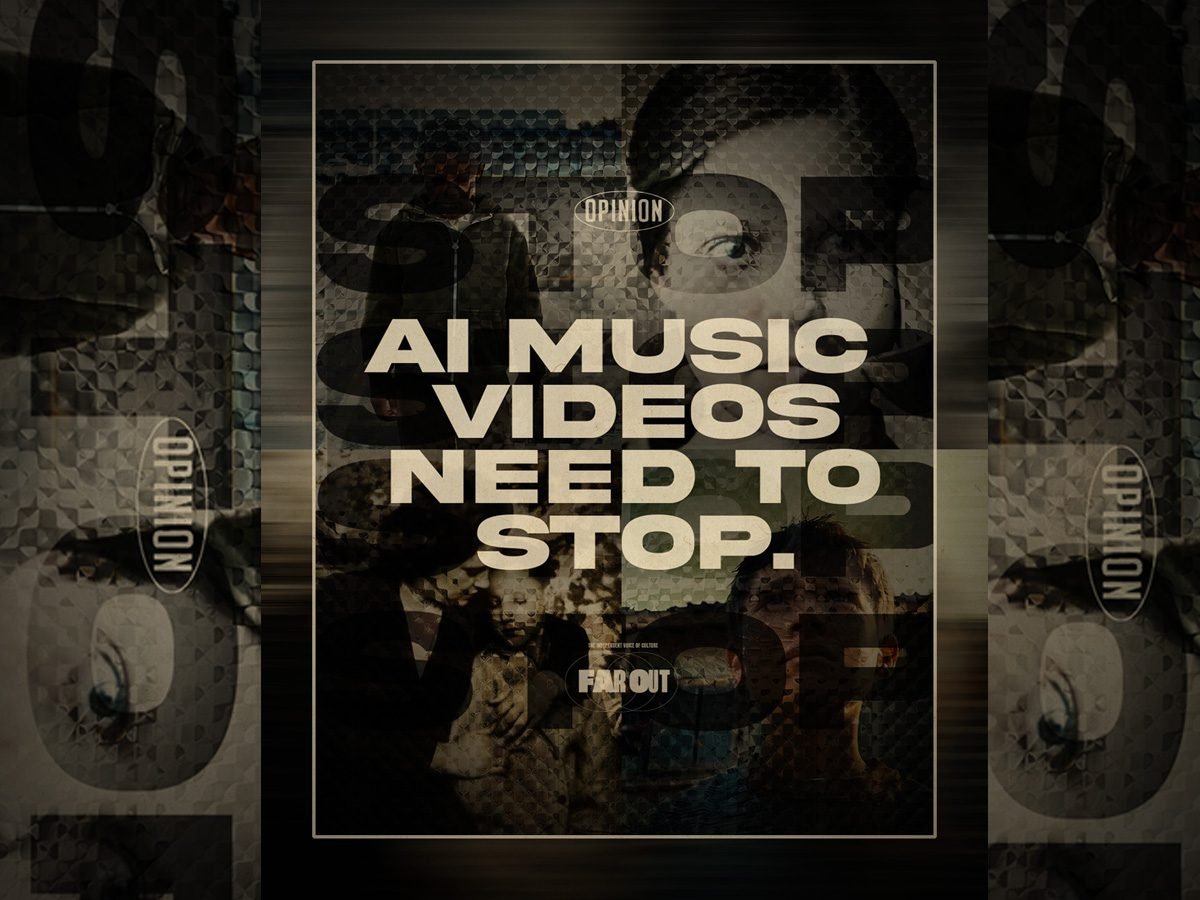
(Credits: Far Out / YouTube Stills)
Let’s spell it out plain and simple: the arts cannot ‘dabble’ with AI. It needs to be dismissed resolutely, or we will face the consequences.
In a period when Nick Cave openly and proudly shared an AI-generated music video, despite previously calling the tech “unbelievably disturbing”, it feels like the unwavering stance of creatives against ChatGPT is slipping. But it can’t. And if that’s not immediately clear, let’s break down why.
Hi, I’m Lucy, and I’m a human. I’m sitting at my laptop right now, hearing the sounds of my fingers hitting the keys, tripping over myself trying to get what’s going on in my brain out into the world. Before beginning this task, I sat here for a while and thought it through. I considered the subject at hand, considered again about the recent AI news coming from Nick Cave and clocked two things in my body. First, a wave of anger at an artist I admire. Second, fear.
I’m a human and I’m sitting at my laptop right now writing this, but I’m all too aware that I could go on ChatGPT and ask it, “Write a piece on why AI music videos are bad”. To make it even scarier, I could specifically ask it to write that piece in my style, and that machine can scan the internet, instantly read everything I’ve ever written, analyse my sentence structures and my tone, and become me. I am all too aware that I, already, am replaceable to an extent that should not be possible.
Every single artist feels the same right now. In Hollywood, workers staged the industry’s biggest strike to fight back against the fact that contracts were beginning to include clauses that meant studios could own a performer’s likeness, meaning that they could feed images and videos of say, Florence Pugh, into a machine, turn her into an AI that has her timbre, her facial expressions, her everything. They could deepfake her and then have that cartoon perform. Florence Pugh could be obsolete.
In music, a band called The Velvet Sundown caused controversy. With over one million monthly listeners, they are doing pretty well for themselves and will be bringing in revenue. In fact, they’ll be making pure profit given that they do not exist. There’s no studio to pay, no musicians that need money to survive, no session players to give a wage to. They’re AI, they’re a computer. But when they’re raking in streams like that, surely labels are looking and thinking… wait a second.
At a time when musicians are struggling to survive, when even artists like Orla Gartland or Billie Marten, who can sell out big rooms, are talking about the financial crisis acts are facing, the last thing the music world needs during it’s push for fairness and funds is fake bands to come along that cost nothing and make money.

Then we come to music videos. The fear surrounding AI music videos is historic and connects to the broader art form. At the dawn of the MTV era, the music video was king. Artists would get huge budgets and would collaborate with big-name directors to bring their songs to life in a way that seemed to add a whole new dimension to the release. Then, with the dawn of streaming, the change in the way we consume music and the money crunch artists faced, the art form faded.
Now, a video is a luxury as a lot of artists settle for a simple lyric clip and be done with it, or those with creative friends to help out might DIY a project. Lately, there seems to have been a swing in the other direction with artists going all out on visuals, like The Last Dinner Party creating a short film with rising director Harv Frost, or Wolf Alice hiring a troupe of dancers. But still, music videos are an expense with minimal payoff in the grand scheme of a song’s release, meaning that for people who have spent their lives dreaming of making the clips, or for directors hired to do them, their business was already under pressure.
Then enter Nick Cave, a man who proudly and loudly stood against AI, recently sharing a crappy computer-generated video for ‘Tupelo’, complete with a levitating Elvis Presley and the classic AI-generated weird colouring and mangled fingers. Point one on why AI videos are bad: they’re ugly. A computer cannot grasp beauty. No computer can ever truly know art because it cannot know human emotion and experience. Nothing AI-generated will ever really be that good in comparison to what a creative expert could do.
But beyond that point, beyond the important and terrifying point of the loss of jobs AI could bring about, or the way AI further disrespects the talent of creatives in a world that already seeks to starve them out, there are countless other implications. It spans far and wide into all corners of evil, from the environmental impact as AI demands massive energy consumption and creates a big carbon footprint, to the ethical considerations of computers, owned by mass corporations with questionable motives, essentially using and chewing up the work of real-life people in order to spit out its own slop.
The bottom line is simple: AI is not necessary. Around the world right now, there are talented and experienced music video directors, up-and-comers getting great at their craft, and kids dreaming of one day being great at it, too. There are enough creatives. There are more than enough workers, and they should be given jobs, not having their dreams lazily fed to a computer to do instead.
Related Topics









